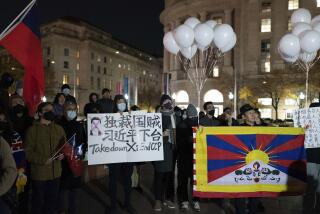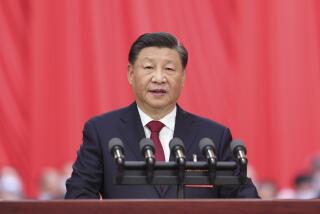Changes in East Bloc Encourage Chinese, Reform Leader Says
- Share via
News of the dramatic changes sweeping Eastern Europe is bringing hope to Chinese intellectuals and others whose campaign for government reform was brutally crushed in June by the Red Army at Tian An Men Square, a founder of the Chinese reform movement said in a speech Thursday.
But Su Shaozhi, who escaped prosecution by authorities in China by coming to the United States last summer, said reforms in his country will probably come only after the deaths of old-time party leaders such as Deng Xiaoping. Shaozhi spoke at the Cal State Northridge campus to about 80 people, mostly professors and a handful of students required to be there for class assignments.
For the record:
12:00 a.m. Dec. 6, 1989 For the Record
Los Angeles Times Wednesday December 6, 1989 Valley Edition Metro Part B Page 4 Column 1 Zones Desk 2 inches; 58 words Type of Material: Correction
China moratorium--An article on Dec. 1 reported that Cal State Northridge President James Cleary had ordered a temporary halt to the school’s academic exchange programs with China after the military crackdown against student protesters in June. In fact it was California State University Vice Chancellor Lee R. Kerschner who ordered the moratorium. Cleary said he argued unsuccessfully against the order.
The government crackdown after the spring uprising by Chinese students demanding government reforms has galvanized public sentiment against the ruling powers, Shaozhi said.
The military action on demonstrations in cities across China provided hard-line party leaders with a convenient excuse to end the few economic reforms that Chinese had begun to enjoy, he said. The result has been a worsening of economic conditions there, he said.
“The whole Chinese nation is in crisis: political, economic and ecological,” Shaozhi said.
The news of government reforms in countries such as Poland, East Germany and Czechoslovakia is trickling into China, despite government efforts to keep the news out, Shaozhi said. Among Chinese students and intellectuals, those developments are helping keep alive hopes for reform.
“But change will take time; one, two years or more,” Shaozhi said.
Shaozhi, 67, urged students and professors at CSUN to continue academic exchange programs with China. After the Tian An Men Square killings, CSUN President James Cleary ordered a temporary halt to such exchanges.
“I encourage you to go and talk to the Chinese people,” Shaozhi said. “I encourage you to, as the party says, ‘pollute’ the Chinese people.”
Cleary’s order to halt the exchanges came after university officials had difficulty securing the return of 15 students and nine professors who were in China when the military crushed student demonstrations in Beijing.
Shaozhi’s appearance at CSUN was the last stop of a two-month speaking tour. It was the second time he has spoken at the Northridge campus, which has established ties with 17 Chinese universities in nine cities.
Shaozhi, who was director of China’s prestigious Institute of Marxist-Leninist Research before falling out of favor with party officials two years ago, said the student demonstrators last spring represented millions of Chinese unhappy with widespread political corruption, nepotism and economic troubles in their country.
Shaozhi, who is a visiting professor this year at Marquette University, said the government, in its attempt to spread its version of the June massacre, has called for the Chinese to rewrite entries in personal diaries for from May 15 to June 15 to reflect the government’s version of events.
More to Read
Sign up for Essential California
The most important California stories and recommendations in your inbox every morning.
You may occasionally receive promotional content from the Los Angeles Times.













